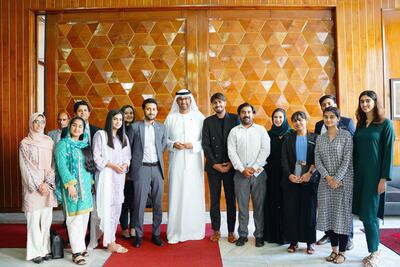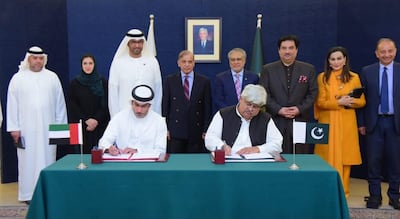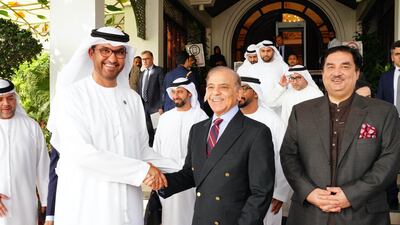Cop28 President-designate Dr Sultan Al Jaber has said developing nations vulnerable to extreme events linked to climate change need greater support.
Dr Al Jaber, who is also the UAE's Minister of Industry and Advanced Technology, was speaking during a visit to Pakistan, where he met Prime Minister Shehbaz Sharif, senior government and diplomatic officials and youth climate advocates in Islamabad.
During the visit, which is part of his global listening and engagement tour, he called for greater collaboration on climate and support for developing countries on the front lines of climate change, according to Wam.
“The reality is that climate change is already having a profound impact on the lives of billions of people and this is something Pakistanis understand all too well,” Dr Al Jaber said.
He was referring to last year's devastating floods that led to swathes of the South Asian country being submerged last year due to extremely heavy monsoon rains and melting glaciers. The phenomenon, linked to climate change, damaged crops and infrastructure and killed at least 1,700 people.
International donors rallied to provide commitments of more than $9 billion to help the recovery from the floods, with rebuilding efforts to cost an estimated $16.3 billion.

“At Cop28, the world’s focus must be fixed on the needs and hopes of people, their voices must be heard and we must respond to their demands with ambition and action,” said Dr Al Jaber.
During his discussion with Mr Sharif, Dr Al Jaber discussed priorities linked to the Cop28 agenda. These included building a robust response to the global stocktake, climate finance and operationalisation of the loss and damage fund, tripling renewable energy capacity by 2030, climate adaptation and resilience and nature-based solutions.
Dr Al Jaber and Mr Sharif witnessed the signing of an agreement between the UAE’s Ministry of Energy and Infrastructure and Pakistan's government to co-operate on development and investments in renewable energy projects in Pakistan.
“We must build the energy system of the future while decarbonising the energy system of today,” Dr Al Jaber said.
“This includes tripling renewables and doubling both energy efficiency and hydrogen production. We must also achieve net-zero methane emissions by 2030 and deliver on net-zero carbon emissions by 2050.”
“We must streamline and simplify access to climate finance and reform IFIs and MDBs, while incentivising the private sector to play a larger role in climate finance.
“Developed countries must deliver on their promise of $100 billion annually to the Global South and the loss and damage fund must be operationalised.”

Dr Al Jaber also met Sherry Rehman, Pakistan's Minister of Climate Change and Environment, to discuss its vulnerability to extreme weather events linked to climate.
During his visit, he also delivered a speech at the Pakistan Foreign Service Academy, emphasising the need for course correction to get the world back on track towards meeting the goals of the Paris Agreement.
He also pointed to the need to “protect nature, enhance food systems, upgrade adaptation responses and bring health on to the climate agenda for the first time.”
He praised Pakistan’s reforestation initiatives which he said “will lead to the expansion of natural carbon sinks, the protection of ecosystems and biodiversity, and better protection against land degradation and climate impacts”.
Red Crescent support
Dr Al Jaber was accompanied on the visit by the Emirates Red Crescent Secretary General Hamoud Al Junaibi, who spoke about responding to humanitarian needs in Pakistan, especially in the aftermath of last year’s disastrous floods.
“The authority has been actively engaged in Pakistan for many decades, implementing numerous relief programmes and development projects in areas such as healthcare, education, social welfare, housing, and other essential services,” Mr Al Junaibi said.
“The Emirates Red Crescent will continue to support vulnerable countries to alleviate the impact of natural disasters, particularly floods and earthquakes.”
Dr Al Jaber met youth delegates in Islamabad from the Cop28 International Youth Climate Delegates Programme and representatives from Youngo, the Official Children and Youth Constituency of the UNFCCC.
“We must have the most inclusive cop ever ─ one that brings everyone to the table, using every tool available, to take a holistic approach to this global challenge,” said Dr Al Jaber.

